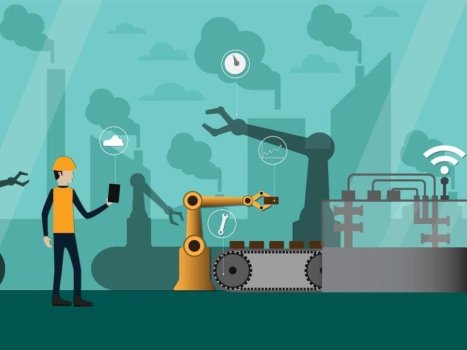K
Kathleen Martin
Guest
Industry (or Manufacturing) 4.0 started as a German government initiative in 2011. It refers to a Fourth Industrial Revolution characterized by smart factories using robotics, autonomous operations, the Internet of Things , big data, analytics, artificial intelligence, and a convergence of IT and OT. The goal is to create efficient, agile and intelligent manufacturing.
There wasn't a prescriptive Industry 4.0 methodology for manufacturers to follow, so early adopters tried various approaches to see which worked best. Now, 10 years later, we have reached an inflection point where Manufacturing 4.0 best practices are emerging, and big data, IoT, AI and automation are all playing critical roles.
"We focus on the capabilities that [Manufacturing 4.0] technology can deliver for our clients," said Stephen Laaper, principal and smart factory leader at Deloitte. "From this perspective, there are
really four technology capabilities that are repeatedly identified across our research and implementation experience."
According to Laaper, where companies are focusing their Industry 4.0 efforts are in:
Complex integrations, and the need for robust security on edge networks and appliances, are likely two of the reasons 80% of respondents in a 2020 Deloitte-MAPI survey of 1,000 manufacturing leaders that Laaper cited said they were employing at least one of these four manufacturing initiatives, yet less than 40% had managed to fully operationalize their deployment.
Continue reading: https://www.techrepublic.com/article/how-to-integrate-iot-big-data-and-analytics-into-industry-4-0/
There wasn't a prescriptive Industry 4.0 methodology for manufacturers to follow, so early adopters tried various approaches to see which worked best. Now, 10 years later, we have reached an inflection point where Manufacturing 4.0 best practices are emerging, and big data, IoT, AI and automation are all playing critical roles.
"We focus on the capabilities that [Manufacturing 4.0] technology can deliver for our clients," said Stephen Laaper, principal and smart factory leader at Deloitte. "From this perspective, there are
really four technology capabilities that are repeatedly identified across our research and implementation experience."
According to Laaper, where companies are focusing their Industry 4.0 efforts are in:
- Factory asset intelligence and performance management.
- Factory synchronization and dynamic scheduling.
- Quality sensing and detection.
- Engineering collaboration and the digital twin.
Complex integrations, and the need for robust security on edge networks and appliances, are likely two of the reasons 80% of respondents in a 2020 Deloitte-MAPI survey of 1,000 manufacturing leaders that Laaper cited said they were employing at least one of these four manufacturing initiatives, yet less than 40% had managed to fully operationalize their deployment.
Continue reading: https://www.techrepublic.com/article/how-to-integrate-iot-big-data-and-analytics-into-industry-4-0/

